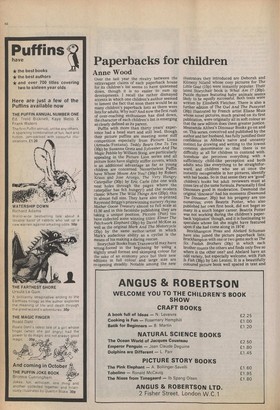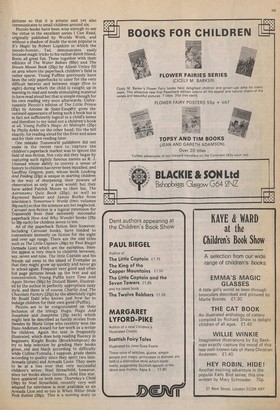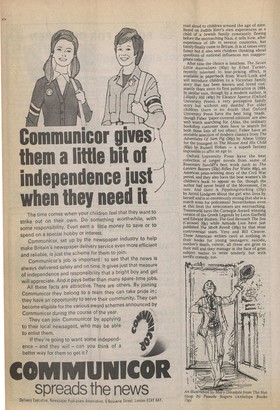Paperbacks for children
Anne Wood
Over the last year the rivalry between the extravagant claims of each paperback house for its children's list seems to have quietened down, though it is no easier to sum up developments. I recall the rather dismayed accents in which one children's author seemed to lament the fact that soon there would be as many children's paperback lists as there were lists for adults. Why not? And now the first rush of over-reaching enthusiasm has died down, the character of each children's list is emerging as clearly defined as its parent. Puffin with more than thirty years' experience had a head start and still lead, though their picture puffins are meeting some stiff competition especially from Picture Lions (Armada/Fontana). Teddy Bears One To Ten (30p) by Susanna Gretz and Sylvester And The Magic Pebble by William Steig, are particularly appealing in the Picture Lion series and all picture lions have slightly stiffer covers, which is an additional advantage as far as young children are concerned. Nevertheless Puffin have Whose Mouse Are You? (30p) by Robert Kraus and Jose Aruego, The Very Hungry Caterpillar (30p) by Eric Carle (the one with neat holes through the pages where the caterpillar has felt hungry!) and the modern classic Where The Wild Things Are (25p), this in almost full size. They have also re-printed Raymond Briggs's prizewinning nursery rhyme Mother Goose Treasury almost to full scale at
£1.50 and in this facsimile publishing they are taking a unique position. Piccolo (Pan) too
have collected some winning titles: Elmer The Patchwork Elephant (30p) by David McKee as well as the original Mark And The Motorcycle
(25p) by the same author/artist in which Mark's audacious ability as a cyclist is the means of his making a daring rescue. Storychair Books from Transworld may have wrong-footed in the beginning by using a slightly small format and skimping colour for the sake of an economy price but their new editions in full colour and large size are re-opening steadily. Notable among the new
illustrators they introduced are Deborah and Kilmeny Niland whose cosy pictures for The Little Goat (I5p) were instantly popular. Their latest Storychair book is What Am I? (20p). Puzzle rhymes featuring baby animals seems likely to be equally successful. Both texts were written by Elizabeth Fletcher. There is also a further edition of The Owl And The Pussycat (20p) illustrated by French artist Eliane Muis whose novel pictures, much prained on its first publication, were originally all in soft colour so that the new edition does them greater justice. Meanwhile Althea's Dinosaur Books go on and on. This series, conceived and published by the author and her husband, has fully justified their confidence in Althea's naive and uncanny instinct for drawing and writing to the lowest common denominator so that there is no difficulty at all for children to contend with. Somehow she perceives everything with a sufficiently child-like perception and both adults who like everything to be straightforward, and children who see at once the instantly recognisable in her pictures, identify with her books. So in that sense they are 'good' children's books but adult reviewers must at times tire of the same formula. Personally I find Dinosaurs good in moderation. Desmond the original 'dinosaur' had his moments (Desmond The Dinosaur, 20p) but his progeny are too numerous; even Beatrix Potter, who also published her own first book, did not beget so many in a much longer career. Beatrix Potter was not working during the children's paperback 'explosion' though, and it is fascinating to speculate whose list she might have featured upon if she had come along in 1974!.
Brockhampton Press and Abelard Schuman have also joined the picture paperback lists; Brockhampton with one or two gems such as The Six Foolish Brothers (30p) in which each brother counts the others and finds only five so where is the other one? and Abelard have an odd variety, but especially welcome, with Fish Is Fish (30p) by Leo Leonni. It is a beautifully coloured picture book well spaced in text and
pictures so that it is artistic and yet also communicates to small children around six.
Piccolo books have been wise enough to see the virtue in the excellent series I Can Read, originally published by Worlds Work, and
without a shadow of doubt the most popular is It's Magic by Robert Lopshire in which the
pseudo-human„ Tad, demonstrates easily imitated magic tricks to his rather dumb friend, Boris; all great fun. These together with their
editions of The Water Babies (60p) and The Brown Mouse Book (25p) by Alison Uttley fill an area where the paperback children's field is
rather sparse. Young Puffins previously have been the only paperbacks to cater for the very difficult betwixt and between stage (five to eight) during which the child is caught up in learning to read and needs stimulating material to have read aloud but that is simple enough for
his own reading very soon afterwards. Unfortunately Piccolo's edition of The Little Prince (25p) by Antoine de Saint-Exupery gives the
outward appearance of being such a book but is in fact not sufficiently logical in a child's terms
and therefore to my mind not a children's book at all. Young Puffin's Magic At Midnight (25p) by Phylis Arkle on the other hand, fits the bill exactly, for reading aloud for the fives and sixes and for their own reading later.
One mistake Transworld publishers did not make in the recent race to capture the children's paperback market was to ignore the field of non-fiction. Not cnly did they begin by capturing such rightly famous names as R. J. ' Unstead whose ability to convey a sense of history to children has never been equalled, and Geoffrey Grigson, poet, whose book Looking And Finding (25p) is unique in starting children in the way of sharpening their powers of observation as only a poet would; but they have added Patrick Moore to their list, The Astronomy Quiz Book (25p), as well as Raymond Baxter and James Burke from television's Tomorrow's World (two volumes 30p each) so that the sciences are not neglected. Carousel non-fiction is a logical extension for Transworld from their extremely successful paperback How And Why Wonder books (25p to 30p each) for children seven to ten.
All of the paperback fiction lists however, including Carousel books, have tended to concentrate intensely on fiction for the eight and over age range. There are the odd titles such as The Little Captain (30p) by Paul Biegel (Armada Lion) which are the exception. Here the appeal is very much to children between, say, seven and nine. The little Captain and his friends sail away to the island of Evertaller so that they might grow up quickly and never go to school again. Frequent very good and often full page pictures break up the text and aid concentration. Young Puffin have Time And Again Stories (30p) by Donald Bisset, illustrated by the author in perfectly appropriate zany style, and there is of course Charlie And The Chocolate Factory (25p) by the absolutely right Mr Roald Dahl who knows just how far to indulge children for their own good (Puffin). Piccolo are to be congratulated on their inclusion of the trilogy Hugo, Hugo And Josephine and Josephine (25p each) which might best be described as family stories from Sweden by Maria Gripe who recently won the Hans Andersen Award for her work as a writer for children. Again the text is frequently illustrated, which does help reading fluency in beginners. Knight Books (Brockhampton) do try to help selection by grading their books green, .red and black according to difficulty while Collins/Fontana, I suppose, grade theirs according to quality since they sport two lists: Armada (plain) and Armada Lions. They seem to be at a loss over that very successful children's writer, Noel Streatfeild, however, since her books about Gemma, child film star, have appeared on both lists. Thursday's Child (30p) by Noel Streatfeild, recently very well adapted for television is now available as an Armada Lion and so too is When Hitler Stole Pink Rabbit (30p). This is a moving story to
read aloud to children around the age of nine. Based on Judith Kerr's own experiences as a child of a Jewish family constantly fleeing before the encroaching Nazi, it tells how, after experience of life in several countries, her family finally came to Britain. It is at times very funny but it also sets children thinking about pate today.
questionsri of national influences not inappro
After nine the choice is limitless. The Seven Little Australians (45p) by Ethel Turner, recently televised to tear-jerking effect, is available in paperback from Ward/Lock and will introduce children to a Victorian family story that has been known and loved constantly there since its first publication in 1894. In similar vein, though by a modern author, is Lillipilly Hill (40p) by Eleanor Spence (Oxford University Press), a very perceptive family story but without any deaths! For older children there is no doubt that Oxford University Press have the best long 'reads,' though Faber 'paper-covered editions' are also well worth searching for. (Alas, the ordinary bookshop customer does have to search for both these lists all too often). Faber have an enviable selection of modern classics from The Adventures Of Sam Pig (50p) by Alison Uttley for the youngest to The Mouse And His Child (65p) by Russell Hoban — a superb fantasy impossible to affix an age to.
Oxford University Press have the best collection of longer novels from some of Rosemary Sutcliffs best work such as The Lantern Bearers (35p) Rifles For Watie 40p), an American prize-winning story of the Civil War penocl, and they also have the best women's lib children's book to appear so far, though the author had never heard of the Movement, I'm sure. And there is Pippilongstocking (35p) by Astrid Lindgren about the girl who lives by herself and is so enormously strong that she is a match even for policemen! Nevertheless even at this level the newcomers are encroaching. Transworld have the Carnegie Award winning version of the Greek Legends by Leon Garfield and Edward Blishen, The God Beneath The Sea (Carousel 30p) while Armada Lion have just published The Mock Revolt (30p) by that most controversial team, Vera and Bill Cleaver.
These American writers cavil at nothing in their books for young teenagers; suicide, mother's death, cancer, all these are grist to their mill and they manage in the face of grim subject matter to write tenderly but with ternfic comedy, too.




































































 Previous page
Previous page